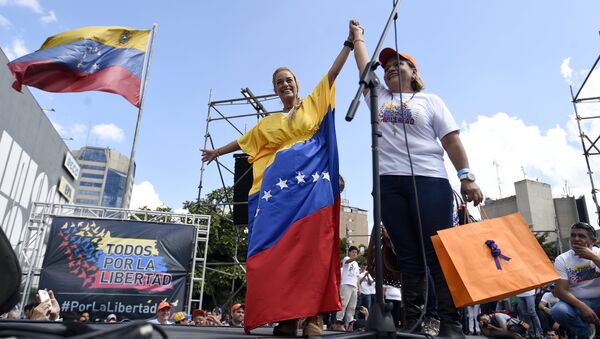1st ballot in #Venezuela election: 99 for opposition; 46 for government and 22 still being counted. Historic pic.twitter.com/g3ThtlVz0T
— Mariana_Atencio (@marianaatencio) 7 декабря 2015
Until the election upset, the socialist pro-presidential party had been in power for 16 years, since then-President Hugo Chavez launched his leftist social movement, the Bolivarian Revolution.
According to Venezuelan sociologist Carlos Raul Hernandez, who teaches political science at several universities, the results of the election drastically weakens the power of President Maduro.
"President Maduro's government is in a precarious situation, because it has received a torpedo at the waterline," Hernandez told Sputnik.
He added that the National Assembly is now emerging as the new "great power" in the country.
Deputy Head of the Institute of Latin America at the Russian Academy of Sciences Boris Martynov agrees that the results of the election will seriously limit Maduro's power.
"It will tie the hands of the government in a serious way, because the fast track passage of any legislation through the parliament is over. Apparently, Venezuela awaits a serious internal political struggle," Martynov told RIA Novosti.
He added that this political rift is merely a reflection of the clear division in Venezuelan society that has been present for a long time.
According to Elio Ohep, the special editor at Petroleumworld Latin American web site, Venezuela can expect reforms in the oil sector, in particular, the creation of favorable conditions for the implementation of several projects in the industry and to attract foreign investment in the short term.
"The National Assembly may revive the industry by adopting laws, including the introduction of changes in the system of royalties and other taxes that will create benefits that can be guaranteed to attract foreign capital," Ohep told RIA Novosti by phone from Caracas.
According to him, the changes will take some six months to be introduced.
"The industry will be able to feel the positive changes, and foreign companies, especially Russian ones, with extensive experience, will be able to assist the National Assembly in implementing these changes as soon as possible," the expert added.
The newly formed Venezuela’s National Assembly is set to commence work in January 2016.


